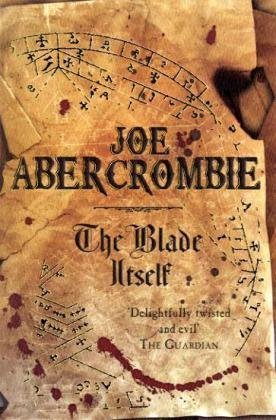Today I'm looking at the first book in a trilogy by Joe Abercrombie, The Blade Itself. I went to the library to hunt down something by Abercrombie specifically because I had encountered a story of his in a short story anthology and I thought he was an author worth investigating. After poking around I settled on this one because it's the first book in the trilogy and it looks like his other stories are set within the same universe. The result is a book that does a lot of establishment work for the universe while leaving some things still unsettled. In retrospect I'm not sure if we really got any indications as to what the main plot is, but the characters are interesting enough that I find I don't mind as much.
The book focuses on a number of characters who gradually get brought together by the first of the Magi, Bayaz. Logen Ninefingers is a barbarian from the northlands who's made a few too many enemies and is almost running out of luck. Jezal dan Luthar is a Union nobleman and cavalry captain who has higher ambitions for his career, but doing so means he'll have to succeed in the annual fencing competition and his skills right now are less than adequate. And there's Inquisitor Glokta, a man who survived the hands of imperial torturers for two years but just barely and has become understandably cynical and bitter. There are also some additional characters but I have no idea how to spell their names aside from Dogman. By the end of the book Bayaz has brought several characters together and is planning an expedition to the edge of the world, but why remains vague.
One of the things Abercrombie does is make his universe seem really complex by including references to a large number of people and events, not all of which are explained in the first book. On the one hand this was a little frustrating for me because I felt like maybe there were books I should have read first, especially since the characters come fully-formed with backstories that I didn't know. On the other hand, this is something that makes Abercrombie's universe deep and realistic which is always a good thing. As always, it comes to me having a much higher tolerance and desire for exposition than other people, but I think Abercrombie still manages to do a good job.
What made me think Abercrombie did a really good job writing this book was when I got to the end of this book and I realized that I still wasn't exactly sure about what the main plot was. I know that Bayaz's teacher was betrayed by his brother who went by the title the Maker. Bayaz and the rest of the Magi defeated the MAker, but the Maker had followers who survived. Apparently the Maker's followers are cannibals who get some sort of magical power from eating people. All I know is that they have some sort of plan, the Union's about to get sucked into a two-front war, and Bayaz is off to save the world. But beyond these generalities I'm a little vague on the specifics. And yet I find myself interested in finding what happens next.
I think the biggest strength is that Abercrombie manages to make the characters compelling. Glokta is bitter, cynical, and like most inquisitors willing to use whatever means necessary to get the truth he wants, but there are complex elements to his personality which makes him more than just another zealot. Luthar has elements of a spoiled dandy but he's also ambitious and willing to work to achieve those ambitions so it makes a more balanced character. So I think if anything, it's the characters which make the book more interesting.
Overall, despite the issues which I had with the book I'd find myself recommending it to people who like extensive worldbuilding and good plotlines. I think Abercrombie's writing more than makes up for any defects and makes the book really enjoyable.
- Kalpar


No comments:
Post a Comment